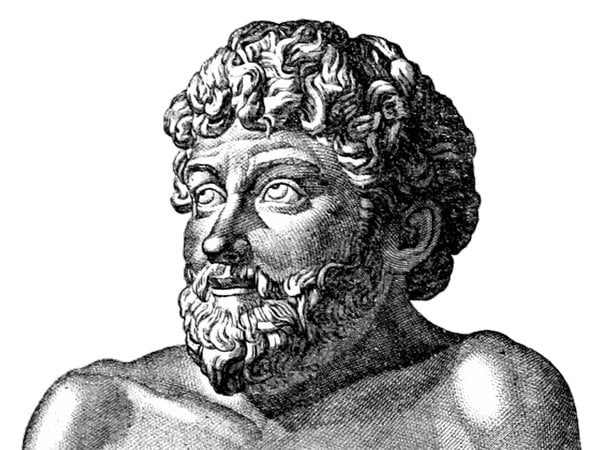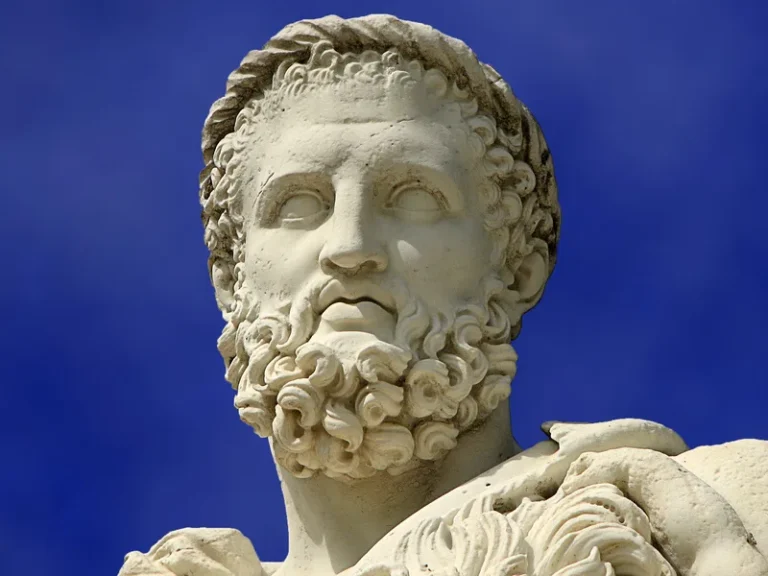Aesop and Aesop’s Fables
Aesop was an Ancient Greek writer who lived in the 6th century BC in Athens, Greece.
Aesop (Aisopos in Greek, Αίσωπος) is known about the myths he wrote, referred to as Aesop’s Fables.
Little is known about the life of Aesop. According to historical facts he was a slave, while some legends suggest Aesop was an ugly hunchbacked slave, although his real appearance is a mystery.
One thing is known for sure – Aesop was a very smart, resourceful and inventive man. And thanks to these qualities he was able to acquire his freedom.
Legends about Aesop
One of the most famous legends tells that during a feast, the lord of Aesop too boldly stated that he would drink the sea. If he couldn’t he would lose all his wealth. The next morning, realizing his claim was impossible to complete, he called Aesop.
The slave quickly realized the trouble his master was in and promised that he would help save his dignity and honor. Both men went to the seashore to face a noisy crowd, gathered to see how the stupid man would “drink the sea”.
Aesop explained to the people that his master could “drink” the sea, but for the rules to be met all the water from the rivers and lakes, flowing into the sea, should be removed.
Needless to say, nobody was able to separate the sea, and the master saved his wealth and honor. As a reward, Aesop received his freedom.

The Death of Aesop
In every story in which Aesop is the main character, he is always more clever than his master, and more wise than the wisest of men. That is why the Delphic priests of the temple of the Greek god Apollo did not forgive the wisdom of the slave.
Legend has it that Aesop was thrown from a cliff into the sea and accused of stealing a golden cup from a temple. The priests were punished for their immoral actions by Apollo, who sent a plague to sicken his unworthy servants in his Delphic shrine.
We can only speculate whether this is the truth about the death of Aesop. However, We do know that his name is associated with the emergence of fables as a genre in Greek literature.
Aesop takes themes and ideas from the folk heritage to create his works. The fables of Aesop were not written during his lifetime, but were passed from mouth to mouth. Over time, more fables were attributed to Aesop.
Eventually, a collection of 352 interesting and original Greek myths was created, simply called “Aesop’s Fables“.
Aesop – The Ancient Writer of Greek myths and Fables
As a genre of fables they are close to the artistic atmosphere of fairy tales about animals. They are not the typical Greek myths that we know from the Greek mythology about Gods and Heroes.
Observing the life and characteristics of animals, the fabulist makes a comparison between them and the moral characteristics of men.
Trickery is not only exclusive to the fox, calmness – not only for pigeons, deceit – not only for the snake, cowardice – not just for rabbits.
All these properties can be encountered in the conduct of people. Seeing these similarities, people began to call one another fox, snake, rabbit in their domestic relations.
But the images of animals and plants also have a parabolic meaning: the donkey began to express the characteristics of a hard and stupid man, the sheep – of the gentle and harmless, the snake – of the evil and vindictive, and the wolf reveals the nature of an evil and cruel man.

Teachings and Precepts in Aesop’s Fables
In that sense Aesop summarizes the essential morals of his time, giving them a satirical evaluation. To hide the sharpness of his critics, but also to provoke the resourcefulness of people, Aesop often likens people with animals and plants.
This particular sense of expression has been associated with Aesop throughout the centuries, starting from ancient Greece, going into Rome and Byzantium, reaching the Renaissance and surviving until today. Since the time of Aesop the fable was a powerful tool to expose and ridicule our ills and vices as people and as a society.
Aesop’s fables may be short, but offer a wise lesson in the end. It is up to us to discover ourselves what is hidden behind the images presented by the author.




I ought to working but this website concerning Aesop, the ancient Greek writer of Aesop’s fables is excellent
I’m doing Aesop for my research paper and its hard to find reliable websites this one is obviously a reliable website to use instead of generic sites that copy other websites to look real.Also, there isn’t alot of websites to find about Aesop these days, and sometimes you can even find stuff like are not even related to your search like Google “Aesop” and you’ll find some info, some good sites, and then you’ll find “Aesop” you might be thinking this seems pretty reliable but it actually says if you read it closely…. “Aesop” skincare lotion, Aesop has provided lots of skincare for hundreds of years.” and then I start RAGING because I printed that out!